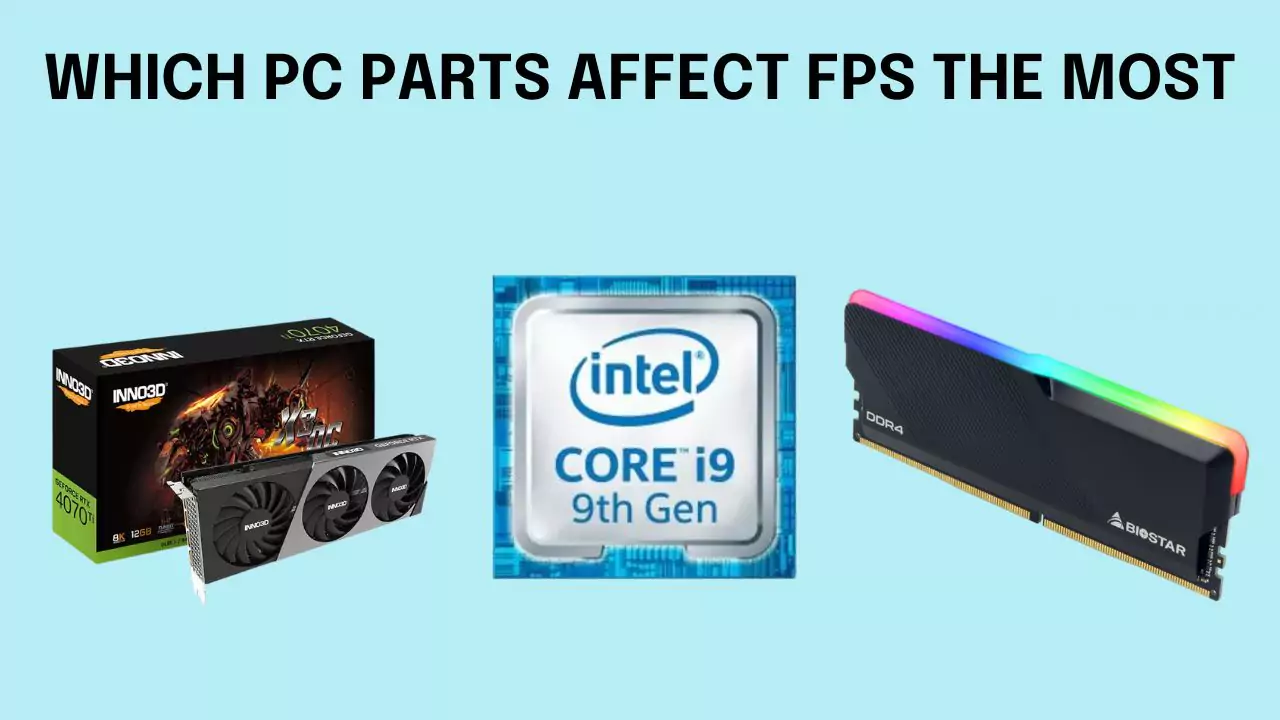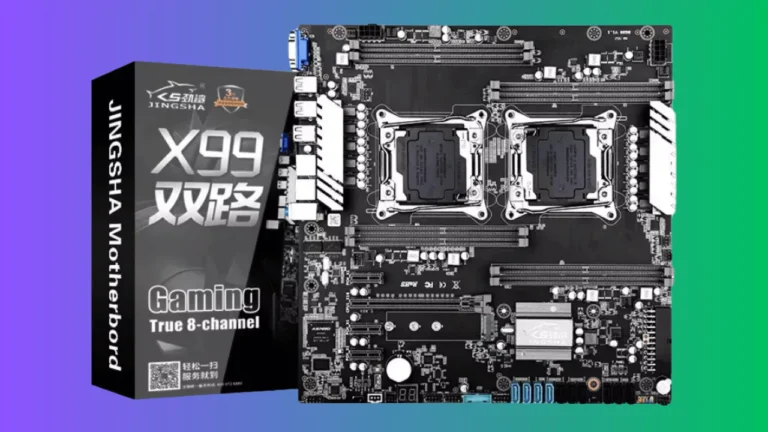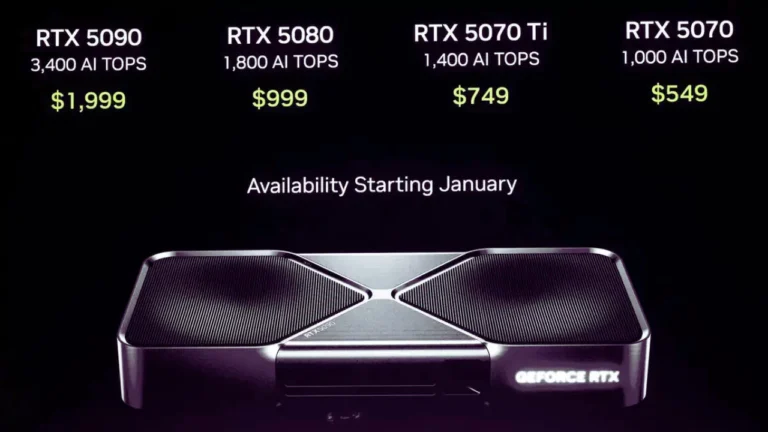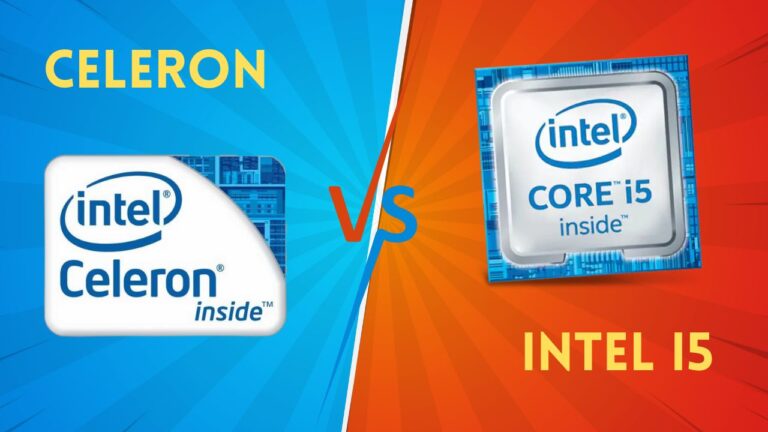The PC parts most affecting FPS in games are the GPU, CPU, and RAM. The GPU renders graphics, so a newer, more powerful graphics card often greatly increases FPS.
The CPU processes game logic and physics, so a faster CPU can raise FPS, especially in CPU-heavy games.
More RAM lets the game load higher-resolution textures and reduces stuttering from insufficient memory.
Other parts like storage, motherboard, and cooling indirectly impact FPS by influencing component speeds.
But the GPU, CPU, and RAM directly improve FPS the most. Choosing powerful, current-generation parts for these three is key to a high FPS gaming PC.
Which parts of the PC affect FPS?
By understanding which parts of the PC affect the FPS most would help you to enhance the performance of the PC. The FPS that is being displayed on the screen is greatly affected by the GPU. So, the faster the graphics on the screen, the faster FPS will be.
Here, the CPU also plays a significant role in increasing the FPS so that it can be compatible with the GPU performance and also prevent a bottleneck.
How much does the CPU affect the PC’s performance?
The CPU is the operating system of the computer, so the faster the CPU is running the faster will be your PC. It carries out different tasks through specialized components, for example, the CPU renders to work with the GPU. And, The GPU, in turn, is designed to be quicker at rendering than the CPU.
A graphics card can only perform to its highest limit if you instruct or if it understands the in-game environment. This is where the CPU comes into action which tells the GPU about the kind of environment and also describes the gaming environment so that the GPU can work properly.
Elements that the CPU deals with during the gaming processing, such as game physics, NPC, logic, player interaction, etc. So, this indicates that the CPU and the GPU performance are quite integral when the GPU rendering gets demanding. This is where the CPU affects the FPS.
Does the CPU speed affect FPS?
The speed at which the CPU runs is measured in gigahertz which is also called clock speed. It is indicative of how many times the transistor would switch on and off every second. The clock speed affects in-game and FPS because the more cycles per second, the more game instructions it can process per second.
If you are about to get a high-end CPU, then you must find a clock speed of 5 gigahertz for gaming. But, there are other factors that affect the overall CPU speed, that are, transistor density, and architectural design. So, if you are wondering what would be the overall speed of the CPU, then check how many instructions per clock cycle it can perform.
How many cores are required for gaming?
If we divide the CPU, then it gets separated into processing units which are called cores. These cores are responsible for processing and executing any game instructions. So, the more cores of the CPU, the more it can process or execute any task. But, what would be the sufficient number of cores, depends on the software that is programmed and designed.
Usually, high-end games depend on a single core and do not require multiple cores, but there are also certain games that depend on multiple cores, and so a CPU has to go through multiple-core performance. Thus, if you are asking how many cores are required for gaming then 6 CPU cores should be enough. Now, this would also increase the FPS.
Does CPU temperature affect FPS?
CPUs are designed to bear the hot temperature and it does not even reduce the performance when it reaches the maximum temperature threshold. There are in-built safety measures that prevent CPU damage which even shuts down the CPU. Otherwise, you can also get a CPU at a maximum temperature but it might affect the internal components and so precaution is necessary.
When a CPU reaches its maximum temperature threshold, it does not affect the FPS, but if the temperature is likely to cross then the FPS can overheat. So, it is always advised to keep a check on the CPU’s temperature, compare the maximum temperature rate, and also go through the manufacturing website about the FPS. This will help you to stick to a limit and shut down the CPU when it reaches the maximum temperature that can harm the CPU.
How can you keep the CPU and FPS in their correct performance?
To maintain the CPU’s performance and check that the FPS does not get affected you need to boot the PC from time to time, install games that are not pirated, run game clients, keep the drivers updated, check the gaming software before downloading, and also keep the games updated.
Does the RAM affect the FPS?
Yes, RAM is also a very important component that increases the FPS and the performance during any high-intensive gaming. Basically, a good set of RAM can help to enhance the performance as well as keep the FPS balanced. You need to check a few factors while you are buying RAM for your computer. There are different sizes and amounts of RAM, so you need to check the minimum amount that would fulfill all your gaming needs.
You can get 8 GB RAM which is usually recommended for online gaming. If there is a demand in the processing unit of the game, then you need to increase the amount of RAM. However, if you think that increasing the amount of RAM would enhance the gaming experience, then your efforts would be in vain. There won’t be any performance benefit while gaming because the gaming would only use the amount of RAM that is required and the rest would be left useless.
Does the monitor affect FPS?
Yes, the monitor also affects the FPS because they also come with different refresh rates. So, the higher the refresh rate, the faster the monitor can refresh the screen. In case you have a monitor with a 60 Hz refresh rate, but the FPS is 120, then it can only be able to run 60 frames smoothly. So, you have to match the compatibility of FPS and monitor and then prepare a computer system. So, for a 120 FPS, you need a 120 Hz refresh rate monitor.
What are the conditions when the CPU affects FPS?
There are certain factors that affect the FPS, that is: when the GPU is intensive and the CPU is running intensive games that require a lot of logical responses. Also, when you change the graphic settings to its maximum. So, the more the graphics settings, mostly the resolution, the more the graphics card has to do more work, which directly increases the load of the CPU and affects the FPS. Also, if you are playing any game at 4K resolution and haven’t yet upgraded the CPU, then it can likely affect the FPS due to bottlenecking the system.
What are the PC parts you should upgrade to get a better FPS?
If you want a better FPS, you should upgrade the CPU, RAM, graphics card, and also the monitor. However, every component is based on the purpose you are using the computer for.







